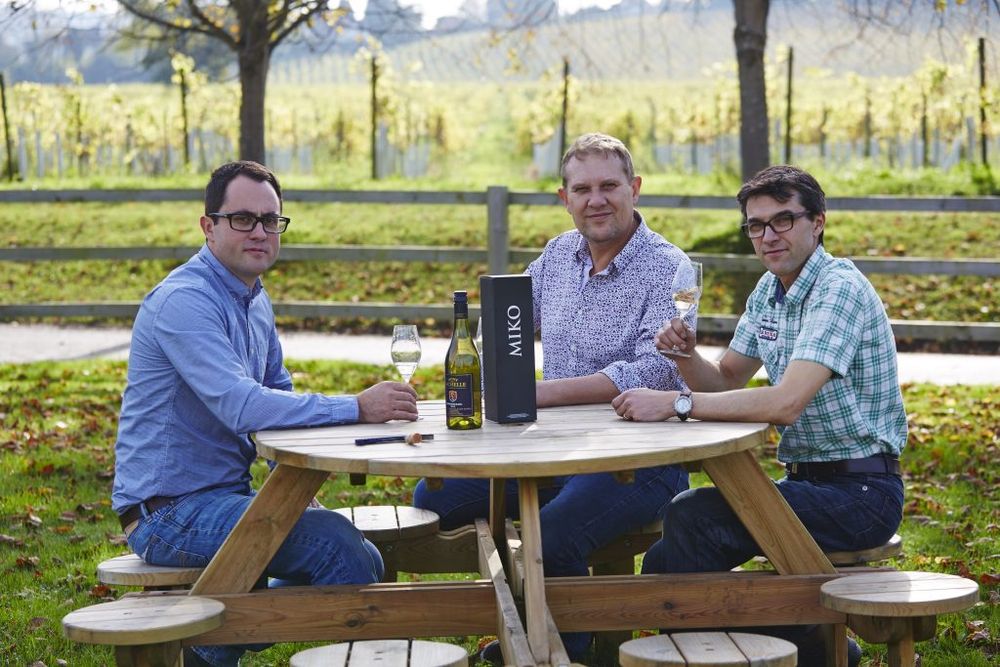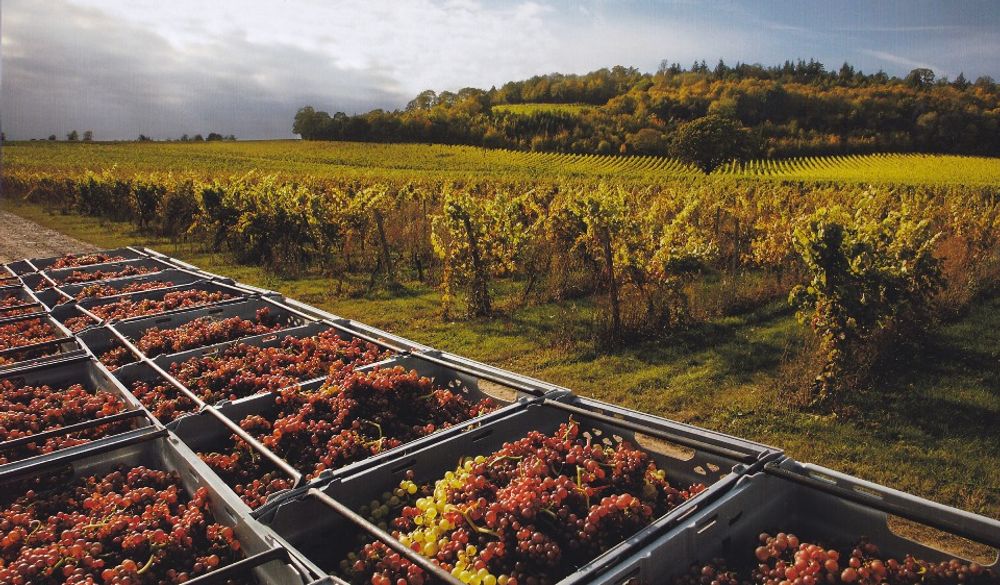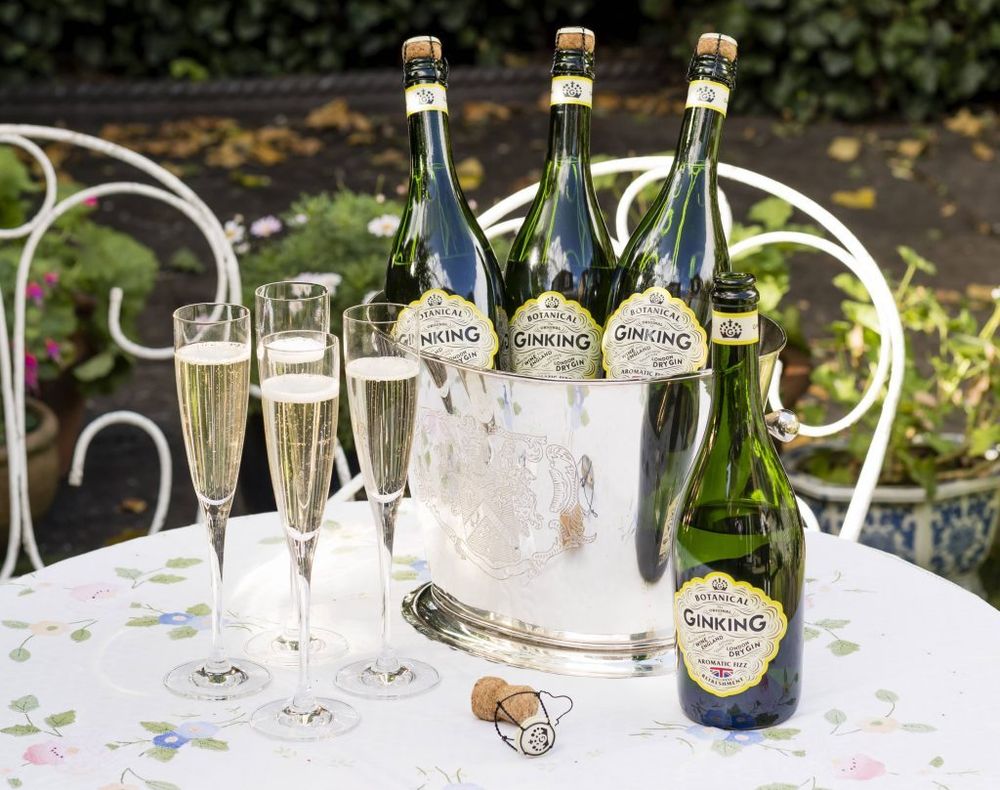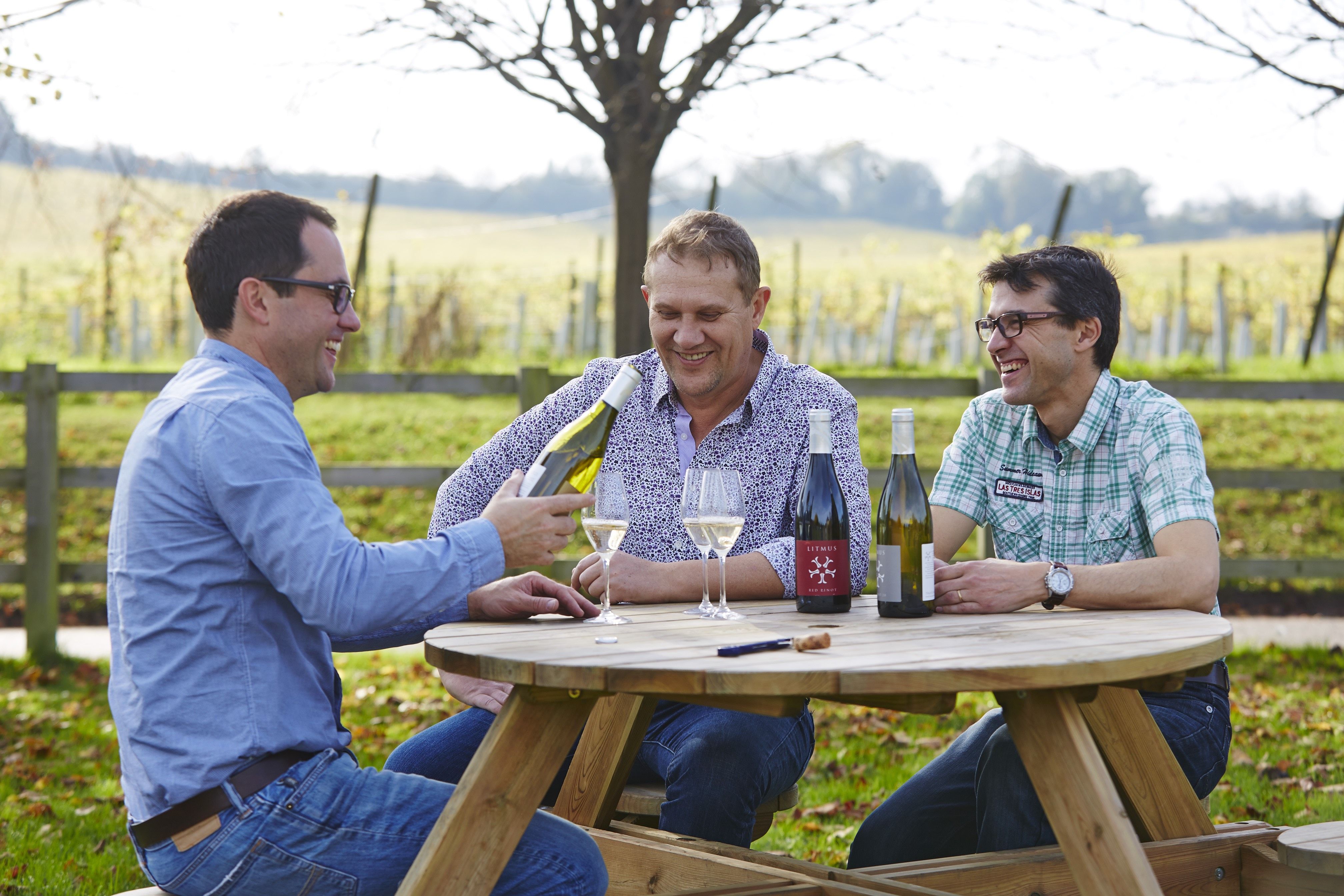If you like and list a lot of English wine the chances are some of it might have been made by Litmus Wines. Here we shine a light on a company that normally likes to remain under the radar.
In the time I have spent writing about wine and having the chance to go and visit companies that either make it, import it or sell it, I have not come across a business quite like Litmus Wines.
At least I have not come across a business so committed to making and selling wine that they actually run their business from amongst all the fermentation tanks at the winery. Where you have to step over winemaking equipment and pipes and pumps just to get their office.
Oh, and a makeshift kitchen complete with gas hob, spice rack and fruit and vegetable display that would not be out of place on Saturday Morning Kitchen. But more of that later.
If you don’t know Litmus Wines, and it does like to keep itself reasonably under the radar, then you will be very familiar with the wines it makes as, essentially the winemaking team behind Denbies Wine Estate in Dorking, Surrey.
Gang of four

The Litmus team: Mike Florence, John Worontschak and Matthieu Elzinga. The team BBQ is just out of the picture
Litmus Wines is actually a team of four. Chief executive, John Worontschak, Mike Florence, general manager, and Matthieu Elzinga, winemaker and cellar manager who each have an equal shareholding in the business. Whilst Nick Connell is head of sales of the Litmus Wine Agencies side of the business.
All of whom, as I discover, have very different but engaging personalities.
Leader of the pack is very much John Worontschak. He is great company and certainly lives up to his billing as ceo– chief entertainment officer. He is also arguably one of the leading and most important winemakers at play in the English wine scene at the moment.
He has had a stop start relationship with Denbies going back to the late 1990s when he first worked there as a consultant, before leaving and then returning initially in 2007 and then to head up Litmus Wines in 2011.
Denbies is quite happy handing over the winemaking, production and selling of its wines to Litmus Wines. An arrangement that has been fully in place since 2011. It makes for quite a unique wine business in that they are in control of every stage of the process.
The origins of Litmus Wines go back to 2008 when Worontschak first started up in business with Sam Harrop MW to offer specialised contract winemaking, importing and agency skills.
Harrop’s decision to move to New Zealand coincided roughly with the time that Litmus was asked to take on the contract winemaking at Denbies.
As well as looking after and working with the grapes grown on the 88 hectare Denbies estate, Litmus also buys in grapes from other producers to make their own branded Litmus wines.
It also acts as a contract winemaker for a number of other English wine producers, where it works in collaboration with Denbies, to make their wines using spare capacity at its winery. This now accounts for around 20% to 25% of its business, says Florence.
But it appears to have quite enough business on its hands just dealing with the amount of wine that Denbies is now making and selling in the UK, and around the world, for itself. It works with most of the major multiples, including Tesco, Sainsbury’s, Waitrose, Marks & Spencer, as well as doing exclusive lines for Lidl and most recently Aldi, which was just coming off the production line during our visit.
Litmus Wines is also selling around half of Denbies’ production internationally to key markets including the US, Japan and the Netherlands, where it is enjoying great success in Michelin-star restaurants.
It is also a key investor (up to 49%) in Richard Branson’s wine project in South Africa with the Mont Rochelle winery and hotel, in Franschoek. Wines it also looks to sell in the UK and around the world.
Worontschak also makes wine on a consultancy basis around the world. Something that he particularly likes doing as it helps him keep on top of winemaking trends in different countries.
Exciting future
Being able to make and work with so many different varieties is what attracted Elzinga to want to move from his family winery in France to England. He says that on the hand he was very lucky in France and had some 215 hectares of Muscadet to work with. But was intrigued by the challenge of coming to make wine in the UK.
“I don’t miss making wine in France. It is too strict. The AOC rules are very restrictive. But here you can do so much more in the vineyard. We can work on so many different blends.”
He says he has learnt a lot working with the UK multiples. Particularly how specific they want their blends to be. Which is why Denbies ferments and presses its wines in different tanks and then brings them together to create unique blends for different customers, to then be aged in combinations of old and new oak or stainless steel tanks.
Keeping still

Litmus Wines is the team behind Denbies award winning English still and sparkling wines
Denbies is following a different path many of the other main English wine producers as three quarters of its production is in still wines. Driven by the demand from the supermarkets. The majority of which are white with vintages of Pinot Noir as and when the weather allows. The last one being in 2014.
It still, though, has an impressive sparkling range and it is an area where Denbies has been prepared to make the necessary investments to help raise the quality, both in the vineyards and the cellars, says Worontschak.
Better pruning, trellising and canopy management are all playing their part, combined with using different types of yeast strains and pressing techniques in the winery, he adds.
It is, for example, doing a Blanc de Blanc for the first time with 100% Chardonnay and has a Blanc de Noirs which will both be ready for release next year after a minimum three years of ageing.
Worontschak is excited about their potential. “They are both the pick of the crop. We think when they come out next year we will be able to play with the big boys with them.”
They will carry a £40 price tag and have a limited run of between 3,000 to 5,000 bottles.
From grape to glass
Litmus Wines is also unusual in that not only does it grow the grapes and makes its own wine, it also goes out and sells it direct to its on-trade customers. As well as its growing list of wines it sells on an agency basis. Like Chris Ringland from Australia, and Gerd Stepp from Germany wines.
“This what we want to be known for,” says Florence. “Wines that punch above their weight and havegood story behind them.”
It also works with wineries to create exclusive labels to sell in the UK. Like the Filature label for the French wine it imports from Domaine Saint Hillaire in the south of France.
As well as making wines, Litmus also acts as partners for wine biological supplier, Lallemand, and its range of yeasts, fermentation aids and bacteria to the trade. From December 1 it going to be the UK agent for wine equipment and oenological products specialists, IOC.
Gin fit for a king

Gin, but not as we know it: with sparkling water and a touch of English wine
It’s not just wine that excites the Litmus team. It has devised what is one of the most innovative products the Buyer has come across in 2016. GinKing. A combination of London dry gin, English wine (Muller Thurgau) from Denbies, and sparkling water. Simple really.
“My wife came up with it,” says Worontschak. “I am surprised no-one has thought of it before.”
What’s more it is only 8.5% abv and has great stand out packaging. Definitely one to watch.
There is a lot more to Litmus Wines than initially meets the eye. In fact next time you are drinking an English wine you don’t recognise, check to see if Litmus Wines has their names on the cork. It’s their not so subtle calling card.
And if you making an appointment to go and see them, make sure you get there around lunchtime, for there are no sandwiches munched at the desk at Litmus Wines. Instead they each take it turns to create elaborate meals for each other. Which often means bringing out the team barbecue, where Worontschak, in particular, seems more than happy flipping a piece of tuna or two for lunch.
This is a wine company that knows which of their wines go with which type of food. Because they spend every day tasting creating dishes to match with them.
































